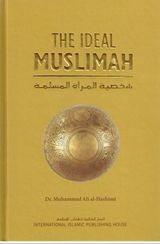|
*This article is written by an SFC Guest Contributor *  Bismillah al-Rahman al-Raheem Assalaamu alaikum, and thank you for stopping by to read my very first article here on Striving for Clarity! I am so excited to be able to contribute to the “Ideal Muslimah” section of this website, alhamdulillah, and today I want to start by writing a short article to share just a couple of my reflections on the idea of the “ideal Muslimah.” Often when we hear the word “ideal”, we thinks of things like our ideal day, ideal job, ideal life, ideal husband etc. These all tend to be things that we either want really bad and don't have, or that we think we “should” have. The word ideal often carries connotations of perfection, of finally having arrived at a long-awaited destination. “Ideal” can often feel like something that is just a dream, a wish, something abstract and unlikely to happen in our real world. I remember one of the books I read within the first year after converting to Islam was The Ideal Muslimah. I loved the book, primarily because there is a lot of valuable information in there.However, the very first time I read it, as a budding new Muslimah only six or seven months into her journey with Islam, it left me feeling a bit overwhelmed. I was sure I could never possibly be a very good Muslimah, let alone an ideal one. It has been three long years since I first read it , and I recently reread the book. It was the exact same copy that I read all those years ago, but with this reading, I took a completely different message from it. This time it left me with a sense of motivation instead of despair. The change was not in the content of the book itself, but it was a change in my own mindset that caused me to take such a different lesson from the book than I had before. I have learned in these three years that on our journey to become the “ideal” Muslimah, ideal doesn't necessarily mean what it sounds like it does in normal usage. On this journey, ideal isn't the end of the journey, it is a constantly changing path. As the name of this site suggests, an ideal Muslimah is actually a striving Muslimah. It is one who recognizes her weaknesses and is seeking to improve them. It is one who desires those good qualities in herself and seeks to practice them. It is one who is working to the absolute best of her capabilities to be the best kind of woman she can be, based on what Islam has outlined for her. An ideal Muslimah is a Muslimah who makes mistakes, and learns how to be better from them. What I want you to keep in mind when reading any of my articles in this section is that no one in this life will ever be perfect. I myself am far, far from it, but every day is an opportunity for us to wake up and be better than we were the day before. We have so many amazing Muslim women as role models both from the time of the Companions رضي الله عنهم(May Allah be pleased with him) and throughout our rich history, and they give us extraordinary, yet human, examples to strive towards. If you are reading my posts and looking to implement changes in your life, I want you to know that change does not have to be a huge grand gesture. Instead, it can be the most minute thing that shifts, as long as you work at it persistently each day. The Prophet said: “Take on only as much as you can do of good deeds, for the best of deeds is that which is done consistently, even if it is little” I have so many ideas for things I would like to share here, and I am so grateful to be able to be on this journey with you, my sisters in Islam. Wishing you all the best, until next time, in shaa Allah! AuthorAshley Bounoura is a writer, revert, tea-drinker, and cat-lover. She is the founder of the blog Muslimah According to Me, where she shares inspiration and encouragement for Muslim women on their individual spiritual journeys. Ashley also has a collaboration on a forthcoming book, the Qur’an Journal, which will be available mid-November,
8 Comments
In the Name of Allah, Most Gracious, Most Merciful  Surah Al-Muzzammil “Truly the rising by night is most potent for governing (the soul) and most suitable for (framing) the word (of prayer and praise).” When reading this surah I was reminded of the significance of “prayer and the practice of humility” in our spiritual life and the fate of those who reject faith and revelation. I noticed Muslim women avoided visiting each other especially before the time of prayer? Maybe some were to busy with children but others felt the same way I used to feel. I was a little nervous and shy about leading the prayer in my home. Usually, my thoughts did not focus on demonstrating my best efforts or learning from guests in my home. I was self-conscious and lacked confidence in my recitation, my Arabic was poor, my knowledge of Islam was limited and I was concerned about the size and comfort of our prayer space. Yes it was my foolish pride. I also remembered being told that sometimes husbands or brothers would recite only the shortest surahs in the Qur’an, as fast as they could. Do you think they rushed to complete the prayer because they were busy with other things or had it become a boring ritual? Also, some Sisters said they preferred not praying at a particular mosque or with a particular Imam. Other Sisters chose not to pray at any mosque. I believed these were cultural issues. “May Allah forgive us.” When is the best time to study the Holy Qur’an with children? They are called “teachable moments.” I understand how hard it is to make time to worship Allah as a family. Especially these days, our lives are filled with so many family or individual social activities. When we were new parents, my husband and I never talked about how to raise Muslim children. Some of our Muslim Brothers told us they planned to marry a woman who had memorized Al Qur’an. This was their plan for teaching Islam to their children. Other parents decided to rely on private tutors and weekend schools at the mosque. We decided to enroll our youngest child in a full-time Islamic school. Her recitation became much better than mine and she actually taught me. I also researched games, puzzles, books and toys to help us study? Some of the other questions included learning and teaching our young appropriate methods for responding to questions and comments from friends and neighbors and also how to talk to others about Islam? Before your child asks the question, be prepared with the answer, or search together. This article is part of the "Micro-Series", The Virtue of a Muslim Woman. Stay tuned for the next part of this Micro-Series.
 Striving For Clarity has started a new "Micro-Series" focused on the qualities and essence of a Muslim woman. The micro-series will consist of short articles written by our Guest Contributor, Khi'dah Nayar. Articles in this series will be posted weekly. About Khi'dah NayarI am a Muslim woman, born in the U.S. and married to an American Muslim. We have four (adult) children. When our youngest child was a middle school student at a private Islamic school, we found opportunities to work with the Muslim community at the grand mosque. We helped coordinate and bring teachers to the community for adult education English, Computer Literacy and U.S. Citizenship classes. Muslim women from Africa, Asia, Caribbean Islands, and South America filled the center. My beloved Muslim Sisters taught me more about Islam, modesty, patience, faith and love for the sake of Allah than I could have learned from any book.
|
IntroductionThe "Ideal Muslimah" section of Striving For Clarity provides an array of articles, micro-series and short tidbits geared towards highlighting the important characteristics of a Muslim woman. Archives
March 2022
Categories
All
|

 RSS Feed
RSS Feed